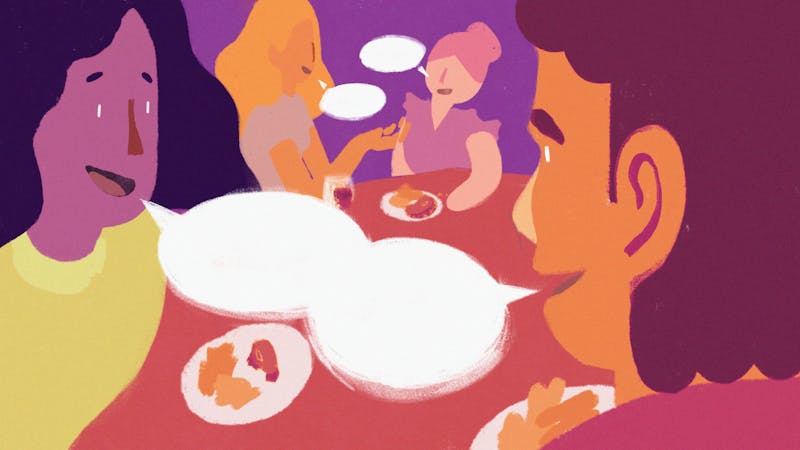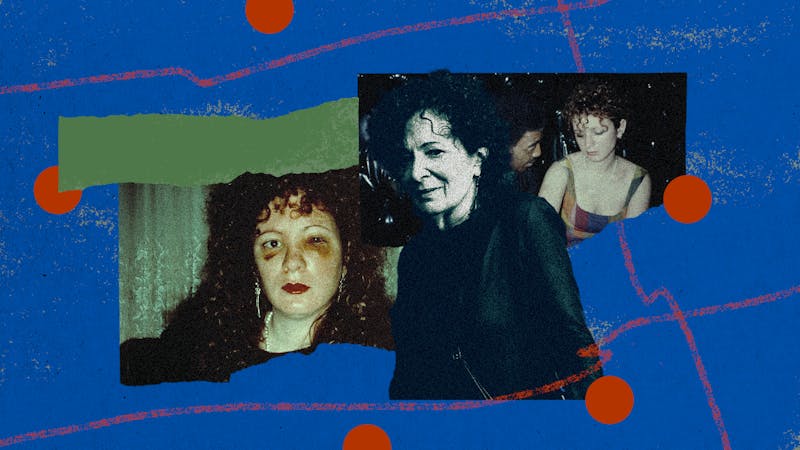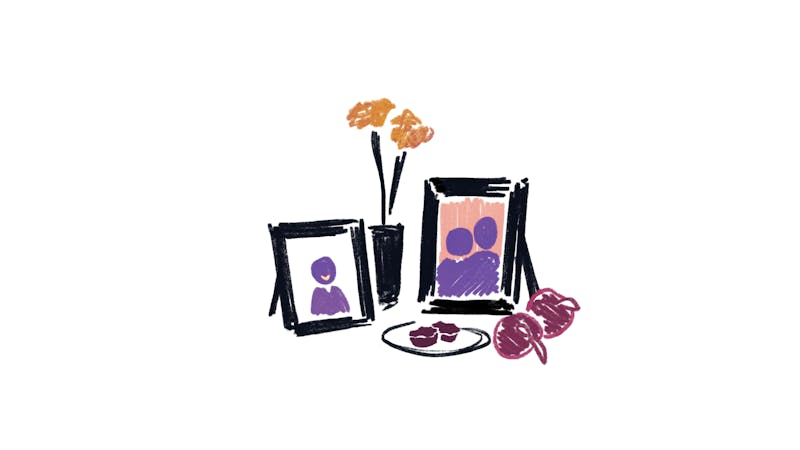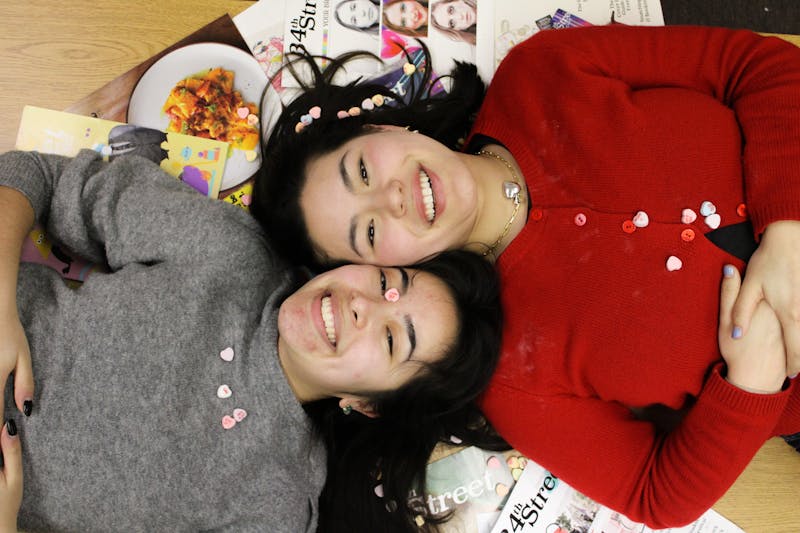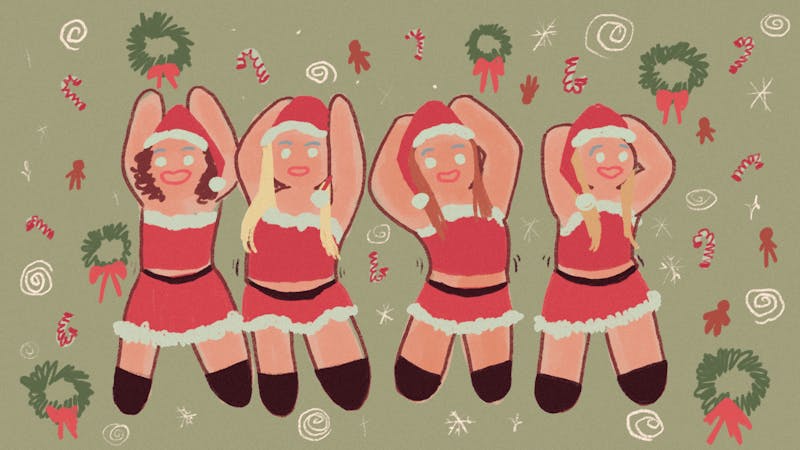Apple cider donuts, gravelly cello music, a vegetable stand run entirely by three blond tweens, and wailing children scraping their knees in the middle of the street. Who runs Clark Park?
The Clark Park Farmers’ Market is a collage of West Philadelphia culture. Running since 1998, the market opens every Saturday morning and features an assortment of produce and trinkets that grant the average Penn student a reprieve from the selections of Acme Markets and Gourmet Grocer. But despite the sweetness of its fat blueberries and the delectable crunch of freshly baked bread, the market itself cannot operate without the hands of its vendors.
These are the stories of the people behind the stands—the humans responsible for the mélange of traditions cushioned on 43rd and Baltimore Avenue.
At 11 a.m. on a Saturday, I enter Clark Park in search of one vendor’s familiar jolly grin and his candle–selling stand. After an artless text exchange of “where are you,” and “over here,” I spot Rasheed Daniels waving to me next to a display of ointments and wellness products.
Daniels seems to have traversed all paths of life. After receiving a degree in radio and television production in Atlanta, he found himself at a crossroads, yearning to engage in an industry that allowed him to make a direct impact on people's lives. Dissatisfied with the avenues available in production, he returned to West Philadelphia and transitioned into a behavioral health career.
“I liked it, but I still wasn't doing what I wanted to do. I wanted to apply whatever I had to offer directly, not just doing what someone else recommended,” he says. Reassessing once again, Daniels pursued a master's degree in counseling which enabled him to work directly with children on the autism spectrum and youth grappling with behavioral problems. Finally, a clearly defined landing point—right?
Not exactly. The paperwork required to be a counselor proved to be demanding and took a toll on him. Then, thanks to his clients, Daniels struck inspiration. As a therapist, many of the people he worked with remarked that he was in a consistently cheerful mood. “How are you always happy? What do you do?” they’d ask, to which he would explain that the majority of his happiness stems from how he approaches health and wellness. For Daniels, this means nourishing your mental health in conjunction with your physical fitness.
Daniels explains that the majority of the clients he serviced did not have a background in health and wellness and instead came to his workplace for medication. During this time, he noticed that a lot of people experimented with mental health medication but would still report feeling unwell, leading to a cycle of prescribing and re–prescribing. This pattern motivated Daniels to open his business, Native Sun Companies, whose goal is to make healthy products feel and taste good.
“The most rewarding part of all this is getting the opportunity to witness the joy from customers in real–time,” Daniels says. Whether it be an ointment that relieves knee pain or a candle that becomes a cherished birthday gift, Daniels believes that community feedback is the primary reason for the business’s longevity and why he continues returning to the market.
Over time, he’s noticed that the same faces show up at his stand every weekend. “They don't care if it's a snowstorm, they don't care if it's a sunny day. They come by the market. They're dedicated,” he says, smiling.

Rasheed Daniels, founder and CEO of Native Sun Companies.
His biggest supporters are the customers he calls “friend–stomers,” strangers who started solely as customers but eventually bonded with him on a personal level. He even recounts how he made multiple visits to a “friend–stomer’s” home after they suffered a fall and had surgery. Despite not working in social services anymore, Daniels says that this habit of constantly checking in on his community has never left him.
Daniels believes that community support from customers and vendors alike is the most important facet of running a small business. In fact, when I tell him who I intend on speaking to next, Daniels’ face lights up. Notably, one of the people integral to getting Native Sun Companies into the market: Pamela Thornton, the founder of Pound Cake Heaven.
Nestled in a sea of white tents, Pound Cake Heaven is nearly sold out of all their pastries before noon. When Street arrives to take photos, Thornton exclaims, “I wish you came earlier!” and begins rearranging the remaining sweets on her table. Her business is a well–oiled machine—you’d think that Thornton has been selling cakes for her entire life.
But professional baking was not her first career. For 29 years, Thornton worked as a Navy civilian in the Equal Employment Opportunity (EEO) office. She often brought homemade pastries to work socials and luncheons. Not only were her sweets immensely popular among her co–workers, but they also brought Thornton a profound sense of joy. “[Baking] brings me into a different arena,” she says. “It gives me a feel–good feeling. I really can’t describe it.”
Thornton recounts how she transitioned from baking as a hobby to owning her own pastry business, which has served Clark Park for eight years. One summer, she was tasked with looking after both her daughters and her nieces. Working a full–time job and wanting to keep them occupied, she signed them up for a group class at the Wilton School of Cake Decorating. Although it quickly became evident that cake decorating was not in the cards for her girls, Thornton fell in love with the course; she completed 15 more Wilton classes and earned an official certificate in cake decorating.
Equipped with professional experience, Thornton began baking with new fervor, often taking requests free of charge. But after nearly 100 cakes, she decided that it was time to take the next step in developing her craft. She retired from her position at the EEO, started saving money, and rallied her family to build a fully fledged bakery.
Thornton has a particular fascination with creating ornate, tiered cakes. Although they are time–intensive, the process of gradually embellishing each cake is endlessly captivating and one that she prefers to embark on alone. She shares that during the creative process, she enters a “calm” often accompanied by jazz from artists like Boney James.
But despite preferring solitude during the individual cake–making process, family and friends are integral parts of Thornton’s operation. Thornton’s husband is in charge of making Pound Cake Heaven’s acclaimed sour buttercream batter, and her daughter often joins her in the kitchen to help decorate cakes. Thornton also adds that her best friend, Regina, is a key contributor, providing plates of peach cobbler, cheesecake, and banana pudding to the business’ menu.
This comes as no surprise, as Thornton's mother introduced her to her love of baking. Growing up, her cobblers and deep–dish apple pies were family favorites during the holidays. “I used to listen to the comments from my family whenever my mother put [dessert] on the table, and I remember how much they looked forward to it,” Thornton says. Even years later, Thornton’s family still flocks to their mother’s side to indulge in her treats.

Pamela Thornton (left), the founder of Pound Cake Heaven.
On this muggy, overcast day, Pound Cake Heaven’s tent is a splash of joyous purple offering a myriad of sweets. While Thornton takes a phone call, her husband, bundled up against the cold in a beanie and thick gloves, immediately grins and beckons us closer to the folding table.
“Valentine’s Day is here. You have to have cake on Valentine’s Day,” he insists. He extensively describes each of the remaining pastries: cookies with chocolate centers, miniature strawberry bundts, and assorted pound cakes by the slice. “Cake is the key to a girl’s heart,” he smiles. “I’d know.”
Thornton says that the staple of Pound Cake Heaven is its sour buttercream cake, which she deems as the “classic birthday cake flavor.” Made from two thick slices of cake held together by a thin line of cream, one slice is the size of a small Kleenex box and feels like roughly two pounds in my hands. It’s immediately clear why it has become the anchor of her menu. The cake’s density is balanced by the sweet brightness of its icing, and it tastes like a treat that could bring you back to life after a particularly tiring day.
“You see, we'd like to take you back to when your mothers and grandmothers used to bake, and you [would] walk in the house and smell that sweet, sweet aroma,” Thornton says. She proudly recounts that recently, a customer walked into Pound Cake Heaven and told Thornton that the smell of the store reminded him of his mother’s baking in his childhood home. “I couldn’t believe it.”
Thornton’s continued devotion to “bringing people home” is one of the reasons why she longs to bring Pound Cake Heaven back to her home in Southwest Philadelphia. Continuing to rebuild post–COVID–19–pandemic, her family is currently fundraising and accumulating support from community organizations to help her company expand back to where she spent her childhood. “If we could pull off this fundraiser, it would be fantastic because I could stand there in that neighborhood and be proud,” she says.
Thornton gives us two gargantuan cupcakes as tokens of her appreciation. I am still armed with a massive tote bag of sweets when I am approached by a tall man holding two glossy magazines. “Are you a communist?” he asks.
In my previous expeditions to Clark Park, I had often noticed members of the Communist Party holding up kindred magazines and calling out similar phrases: “Do you care about organizing?” “The revolution is now!” Most days, I continue down the street in search of vintage clothes. Today, I stay on the corner of the sidewalk and engage.
He tells me that his name is Chad and that he moved from Lancaster to Philadelphia in September. His group has been regularly advertising the socialist revolution at Clark Park for quite some time, but he has only been flyering at this location for three weeks. He says that Clark Park is a remarkably beautiful farmers’ market and that so far, he has had positive conversations with its frequenters.
Chad became involved in the socialist revolution because he wants to build a better world. Citing the housing crisis and inadequate healthcare system, he explains that the government has failed its people on numerous accounts. He believes that there is no solving American problems based on a capitalist system and that there is no better time to organize than the present.
“Plus, working sucks,” he tells me.
I thank Chad for his time and continue maneuvering through the crowd of couples in paper boy hats and corduroy overalls. A man begins playing Bach on his lime green cello, and two toddlers pick fights in their wagons. I follow their scuffle until the scent of baked goods leads me to Lost Bread Company, where Peter Griffin is unloading more goods to display underneath his tent.
Griffin is from Bethlehem, Pa., and is currently an adjunct professor of architecture at Temple University. After a year of working with Temple, his sister referred him as a part–time salesperson for Lost Bread Company. “Since then, I have had the luxury of being exposed to too many baked goods—to my waistline’s groans,” he laughs.

Peter Griffin, an adjunct professor of architecture at Temple University and a part-time employee at Lost Bread Company.
Griffin shares that he was immediately enamored with the community at Clark Park, which is uniquely eclectic and operates on a large scale. Unlike places like Rittenhouse Square, which is dominated by the formal features of its architecture, Clark Park is a people–led space. The constant energy from fascinating customers and friendly vendors make his Saturdays feel less work–like. “I also think it’s a very honorable thing to be able to go and give people nice food or a nice product that you believe in,” he says.
“Why do you believe in Lost Bread?” I ask him.
For one, Griffin says that Lost Bread Company focuses on the locale by sourcing their grains from nearby farms and milling them in Philadelphia. They also aren’t afraid of naturally imperfect products. As opposed to brands sold in mainstream supermarkets, which require invariability from shelf–stable products, Lost Bread Company does not believe in tossing less–than–uniform bread aside; if the bakery’s humidity is off and produces a funky–looking loaf, they happily sell it.
Griffin thinks that because goods sold at farmers' markets depend on seasonality, they resemble a lifestyle closer to that of our ancestors. There is a certain magic in observing farmers selling lush, beautiful greens in the summer before transitioning to tubers and carrots in the winter. “It’s a really lovely thing to be able to think, ‘This is all I can get my hands on, so what can I make with this?’” he says. This responsibility and exploration induce growth and resourcefulness for the market’s customers.
The beauty of being a vendor in the market also lies in the ability to trade, Griffin explains. At the end of the day, he often exchanges his bread with fresh produce from a vegetable vendor or grounds from a coffee stand. Griffin describes it as both a privilege and a low–stakes arrangement; vendors do not go dollar–for–dollar, but rather trade on a barter system—one that allows them to return home with a tremendous bounty of goods.
This highly interactive system, however, is contingent on being able to socialize with one another. Because Griffin has worked with Lost Bread Company since 2018, he’s noticed several changes in the park both pre– and post–pandemic.
Surprisingly, Griffin shares that the pandemic was beneficial to the culture of the farmers’ market. For Lost Bread Company, reconfiguring operations was very arduous, specifically when it came to setting up and tearing down plexiglass shields at every pop–up shop; Griffin likened the experience to moving in and out of a studio apartment every day. However, the pandemic fostered a sense of camaraderie between the vendors at the park. “We recognize each other as people who have been through the same things, even if it’s never been articulated out loud,” he says.
Griffin also believes that the pandemic allowed peripheral vendors to join the Clark Park Farmers’ Market community. These peripheral vendors often sell old records, vintage clothing, and artwork right outside the formal boundaries of 43rd and Baltimore Avenue. Griffin says that prior to COVID–19 restrictions, the Park Association had strictly prohibited external vendors from establishing shops in the area. However, at the height of the pandemic, people in need of a source of income began selling again on the outskirts of the market. Rather than shutting them down, the Park Association allowed this practice to continue.
“I think it's lovely,” Griffin says. “Who doesn't love a good flea market?”
One of these peripheral vendors is Syd Page, who has been selling intricate collage art at Clark Park since last year. Leaning back in black fingerless gloves and a thick nose ring, Page watches park–goers flip through his viewbook of full–size 8.5 x 11–inch artwork. His collages are a series of unexpected textures and carefully constructed thoughts pulled from different magazine quotations. One collage draws from at least seven different tactile sources and reads, “Every / silent cry / full of life / and love.” Beneath a protective layer of plastic is a black–and–white cut–out of a family playing frisbee on the beach, but the original photo’s monochrome ocean has been replaced with a sea of red.

Collage art sold in Clark Park by vendor Syd Page.
Page tells me that he has been making collages since 2018 and that each collage is individually sacred as a process and a product. He currently owns three unorganized boxes filled with vintage magazines and advertisements and is still accumulating new thrifted materials. For Page, it is equal parts a treasure to search for elements as it is to create something new.
As more people pass by to look through his flipbook, I notice that each onlooker sees something different in his collages. Page’s collages are deeply personal, works akin to diaries or what he coins “creative confessions.” The work in his viewbook is ordered by date so that he can reflect on where his head was at the time of each collage’s creation.
I tell him that I admire his courage; it seems intimidating to have one’s emotions laid bare for strangers’ observations.
Page, however, thinks that sharing is a gift. “I believe that art should be accessible to as many people as possible, and I like making art that connects with people.”
In the hustle of the Clark Park Farmers’ Market, connection is abundant. Of course, people are zeroed in on themselves, focused on browsing retail and hunting down produce for the week. But despite these surface–level divisions, they are also experiencing the world together: healing their bodies with herbs and oils, tasting whispers of home with a bite of poundcake, and breaking bread with new and familiar faces.
“Coming to Clark Park every week means speaking to people,” Page says as he presents his collection of handmade bookmarks to us. “We are sharing the truths of life.”
